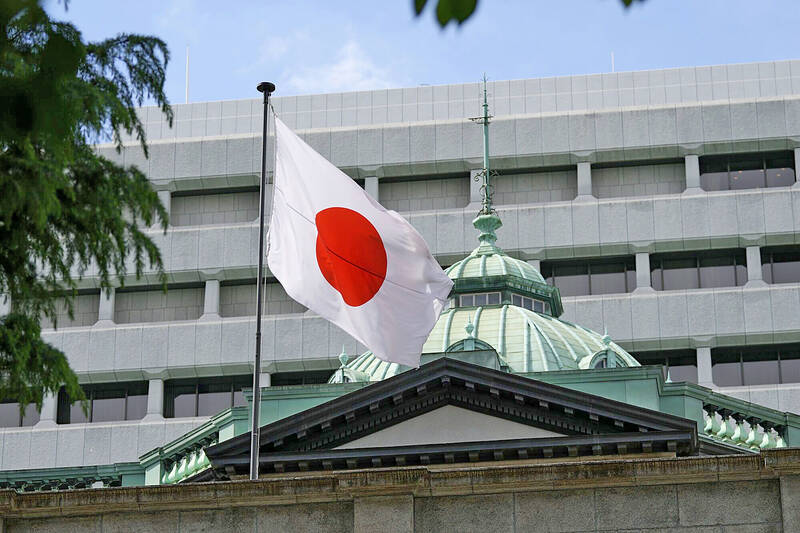The Bank of Japan (BOJ) yesterday revised down its growth forecasts and held interest rates steady, warning that trade tariffs were fueling global economic uncertainty.
BOJ Governor Kazuo Ueda said that it was difficult to assess the impact of the sweeping levies imposed by US President Donald Trump and retaliatory measures by affected nations.
“The level of uncertainty will be significant,” Ueda said. “Even when the overall framework of the tariffs is decided, it will still be the implementation of tariffs of an unprecedented scale.”

Photo: Bloomberg
Trump’s hardball campaign to rectify what he says are unfair trade imbalances includes tariffs on trading partners, and imports such as steel and automobiles.
The BOJ said it now expects Japan’s GDP to rise 0.5 percent this fiscal year, which started in April, down from its previous estimate of 1.1 percent.
In the next fiscal year, GDP is expected to expand 0.7 percent, down from its previous forecast of 1.0 percent.
“Japan’s economic growth is likely to moderate, as trade and other policies in each jurisdiction lead to a slowdown in overseas economies and to a decline in domestic corporate profits and other factors,” the bank said.
However, “factors such as accommodative financial conditions are expected to provide support” and “thereafter, Japan’s economic growth rate is likely to rise,” it said.
The BOJ’s decision to stand pat on interest rates following a two-day policy meeting had been widely expected. Its key rate is still much lower than the US Federal Reserve’s 4.25 percent to 4.5 percent and the Bank of England’s 4.5 percent.
UBS Group AG economists said ahead of the BOJ policy meeting that “market fragility and uncertainty in the global economy due to the US tariff/trade policies” would lead the bank to hold rates, while Capital Economics Ltd analysts said more interest rate increases could still be on the table later this year.
Japanese tariff talks envoy Ryosei Akazawa was to hold a second round of negotiations later yesterday in Washington, seeking to secure relief from the trade levies.
“Fruitful negotiations between Washington and Tokyo to mitigate the impact of tariffs on exporters may help Japanese policymakers in hiking interest rates,” Sumitomo Mitsui Trust Holdings Inc senior strategist Katsutoshi Inadome said.

In Italy’s storied gold-making hubs, jewelers are reworking their designs to trim gold content as they race to blunt the effect of record prices and appeal to shoppers watching their budgets. Gold prices hit a record high on Thursday, surging near US$5,600 an ounce, more than double a year ago as geopolitical concerns and jitters over trade pushed investors toward the safe-haven asset. The rally is putting undue pressure on small artisans as they face mounting demands from customers, including international brands, to produce cheaper items, from signature pieces to wedding rings, according to interviews with four independent jewelers in Italy’s main

Japanese Prime Minister Sanae Takaichi has talked up the benefits of a weaker yen in a campaign speech, adopting a tone at odds with her finance ministry, which has refused to rule out any options to counter excessive foreign exchange volatility. Takaichi later softened her stance, saying she did not have a preference for the yen’s direction. “People say the weak yen is bad right now, but for export industries, it’s a major opportunity,” Takaichi said on Saturday at a rally for Liberal Democratic Party candidate Daishiro Yamagiwa in Kanagawa Prefecture ahead of a snap election on Sunday. “Whether it’s selling food or

CONCERNS: Tech companies investing in AI businesses that purchase their products have raised questions among investors that they are artificially propping up demand Nvidia Corp chief executive officer Jensen Huang (黃仁勳) on Saturday said that the company would be participating in OpenAI’s latest funding round, describing it as potentially “the largest investment we’ve ever made.” “We will invest a great deal of money,” Huang told reporters while visiting Taipei. “I believe in OpenAI. The work that they do is incredible. They’re one of the most consequential companies of our time.” Huang did not say exactly how much Nvidia might contribute, but described the investment as “huge.” “Let Sam announce how much he’s going to raise — it’s for him to decide,” Huang said, referring to OpenAI

The global server market is expected to grow 12.8 percent annually this year, with artificial intelligence (AI) servers projected to account for 16.5 percent, driven by continued investment in AI infrastructure by major cloud service providers (CSPs), market researcher TrendForce Corp (集邦科技) said yesterday. Global AI server shipments this year are expected to increase 28 percent year-on-year to more than 2.7 million units, driven by sustained demand from CSPs and government sovereign cloud projects, TrendForce analyst Frank Kung (龔明德) told the Taipei Times. Demand for GPU-based AI servers, including Nvidia Corp’s GB and Vera Rubin rack systems, is expected to remain high,